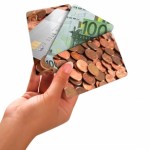Understanding Prepaid Cards
 Prepaid cards, also referred to as reloadable cards, can be used to make purchases anywhere debit and credit cards are accepted. This type of card works a lot like standard debit cards, except you need to load money onto the card before you can use it.
Prepaid cards, also referred to as reloadable cards, can be used to make purchases anywhere debit and credit cards are accepted. This type of card works a lot like standard debit cards, except you need to load money onto the card before you can use it.
With a debit card, you access funds from your bank account every time you make a purchase or withdraw money. However, a prepaid card requires you to already have the funds loaded on your card, and it accesses these funds when you make a purchase.
Prepaid cards can be purchased at banks, credit unions, retailers, post offices, and exchange merchants. The card can be reloaded numerous times and used over again. Keep in mind that it may take several days for the money to appear on your card after being loaded. Plan accordingly, so you always have the funds available when you need them.
Who Uses Prepaid Cards
There are several reasons why someone may want to purchase a prepaid card rather than using a standard debit card.
- Parents Giving Money to their Children. Parents will often purchase a prepaid card for their children and periodically add more funds onto the card. This allows parents to control how much money their children have access to and they can also monitor their spending habits online.
- Ordering Online. Many people worry about using their debit and/or credit card to make online purchases due to security reasons. To protect their identity and keep their information safe, people use prepaid card to make all of their online purchases. This way if their information is stolen, it is only for the amount on the prepaid card, and the thief will not have access to their banking information.
- Securing for Traveling. These cards are also very beneficial for travelling, especially overseas. It is safer than using cash and you can load money in the currency of the country where you are going. You also have the ability to withdraw cash, if necessary on your trip.
- To Control Overspending. Prepaid cards are perfect for people who are trying to control their spending. You can loan the card with the amount of available funds you have to spend and save the rest of your money in your bank account. This will limit you to only using the funds that are on the card.
Fees Involved
While very helpful in certain situations, these cards are not free. There usually a cost involved in obtaining and using a prepaid card. Typically, these costs are higher than what you would find with a debit cards obtained at a credit union or bank. It is important that you compare the different fees involved before selecting the right prepaid card service to use. Here is a look at some of the fees you should look at when comparing cards.
- Purchasing Fee. You may encounter a small fee when you first purchase the prepaid card. This is only a one-time fee charged for each card that you buy.
- Reloading Fee. Depending on the card, you may be charged a small transaction fee each time you load the card with additional funds.
- Withdrawal Fee. There is usually a fee charged for withdrawing money from the ATM machine. If you purchase your card from a bank or credit union, this fee may be waived if you use that bank’s ATM machine.
- Currency Conversion Fee. If you are travelling out of the country and need to use a different currency, you may encounter a fee for that conversion. These conversion fees may vary by the country your are traveling to, so look carefully.
- Fee for Overseas Transactions. In addition, you may be charged a slight fee for each transaction you make overseas. This could add up if you are traveling for several weeks or months at a time.
- Overdraft Fee. You technically should not be able to overdraft on a prepaid card, but occasionally something does not post to your account immediately, it could occur. However, you are likely to be charged a set fee for each occurrence.
Know Your Cards Expiry Date
If you are going to use a prepaid card, be sure to pay close attention to the expiry date on your card. If your card expires, you may lose any funds that remained on the card on the date it expired. You should transfer your funds to a new prepaid credit card close to your expiry date to avoid losing any funds. If your card expires and you did not realise it, contact the place where you purchased your card. They may have a plan in place to help you get your money back.
Image courtesy of Pixomar / FreeDigitalPhotos.net




